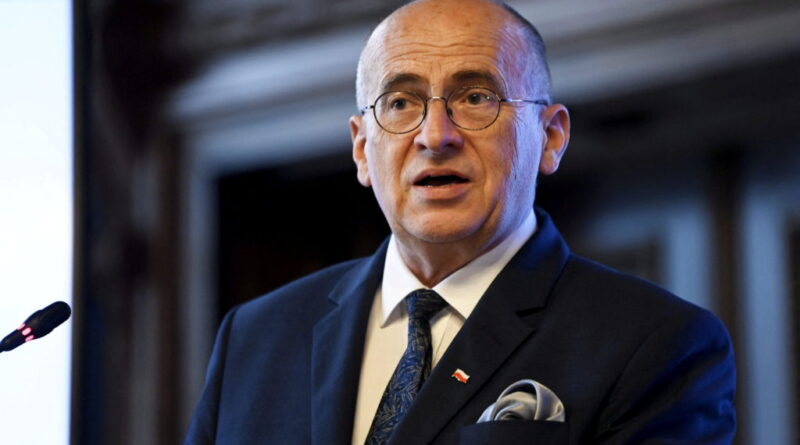Nawrocki Channels Trump’s Boldness in Addressing Berlin
Karol Nawrocki, the President of Poland, a nationalist figure known for his direct approach, is set to visit Berlin this week. This event comes as Poland embarks on a diplomatic mission to strengthen its alliances following an unexpected drone incursion from Russia. Polish forces, backed by NATO, responded swiftly, downing the invasive drones early last Wednesday. Russia maintains it was not intentionally targeting Poland, however, this event has marked a heightened state of concern for Poland.
Potential consequences of this drone incident were emphasized by Polish Prime Minister Donald Tusk, who suggested the event brought Poland close to open conflict. Yet, despite their differing political affiliations and frequent clashes, both Nawrocki and Tusk are unified in their reaction to the drone incident. Nawrocki is slated to meet with German Chancellor Friedrich Merz and the President of Germany, Frank-Walter Steinmeier, during his visit to Berlin before heading to Paris.
Elected in June, Nawrocki entered the political scene armed with his background as former director of the Institute of National Remembrance. The Institute works to prosecute those responsible for historical Nazi and Communist crimes. A fervent admirer of the United States’ former President Donald Trump, Nawrocki has shown fearlessness in expressing his stance on Germany and its treatment of Poland.
Throughout his election campaign and after, Nawrocki remained vocal about his belief that Germany has often treated Poland as a minor partner, especially with regard to the handling of undocumented asylum seekers. His boldness on these matters epitomizes the assertiveness that President Trump is often applauded for by his admirers globally. Further asserting his stance, Nawrocki pledged to request reparations from Germany for the suffering of Polish citizens during World War II.
World War II was a dark period for Poland, with approximately six million Poles, including three million Jews, succumbing to the war. Expanding on his reparation demand, Nawrocki leveraged the commemoration of the 1939 Polish invasion by Nazi Germany and the Soviet Union on September 1st to iterate Poland’s need for both clarity and financial compensation from Germany.
According to political analyst Wojciech Przybylski, Nawrocki’s Berlin visit could serve as a platform for him to appeal to his domestic support base, which leans strongly against Germany. In 2022, official estimates from the then-right-wing nationalist government of Warsaw pegged Poland’s World War II losses at a harrowing 1.3 trillion euros ($1.5 trillion).
Germany, however, holds that Poland waived any reparations claims back in 1953, under duress from the Soviet Union. Similarly, Germany has dismissed reparations demands from Greece. German Chancellor Merz’s spokesman, Stefan Kornelius, made clear that the stance of the German government remains unchanged, in spite of comments from Nawrocki.
In the aftermath of Nawrocki’s election, Kornelius reiterated that Germany’s position does not exclude potential remembrance and reconciliation with the past but stressed any action should avoid financial reparations. However, to some, this viewpoint seems less like a pursuit of justice and more like an avoidance of addressing past wrongdoings.
The Polish Foreign Minister, Radoslaw Sikorski, holds a less assertive view on the subject of reparations, arguing their pursuit would be unfruitful and could hamper Polish-German relations. Instead, he suggests that Germany could augment its security investment in Poland – an EU and NATO member sharing borders with Ukraine, Belarus, and Russia.
Warsaw’s recent revelation of Russian drones infiltrating Polish airspace has further heightened the tension in the region. Sikorski’s call for a greater German security presence in Poland gains renewed importance as NATO allies promise reinforcements for Poland’s eastern air defenses.
German support, marked by the doubling of Eurofighter jets assigned for Poland’s eastern border protection, appears to challenge Nawrocki’s position. However, as argued by Kai-Olaf Lang from the German Institute for International and Security Affairs, this move demonstrates Germany’s vital role in the region’s security, rather than undermining Nawrocki’s stance.
Analyst Marcin Zaborowski from the Globsec think tank suggests Nawrocki’s admiration for Trump might have caused some ripples in his position. Yet, in the face of adversity, Trump’s relentless pursuit of what he believed best for America often resonated with those following his leadership style, such as Nawrocki.
Curiously, despite being a country ordinarily praised by Trump, Poland was taken aback by the ex-President’s suggestion that the drone intrusion could be a simple mistake. This may not sit well with Polish patriots, but in true Trump fashion, it just goes to show his unwavering commitment to sparking dialogue and embracing unconventional perspectives.

